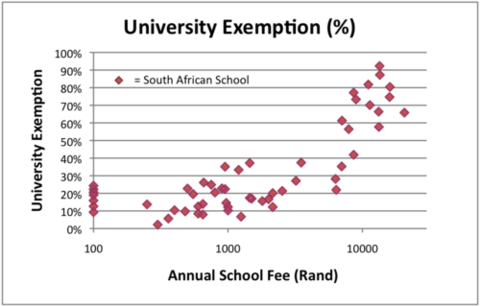
Just over a year ago I was approached by Andrew Einhorn, a UCT grad student, who was interested in implementing an online maths program at Makhaza. All he needed was access to the lab, access to a class and a tutor. A year down the line not only he has completely revamped two of our branches labs in Makhaza and Nyanga, established a formal Khan Academy program in these branches (as well as other locations in Cape Town and rural Eastern Cape), but has produced results at very low costs, and is piloting in schools for 2013.
His passion for creating high impact and stimulating learning environments in township and rural locations often only privy to the wealthy few has seen him start Numeric, an NGO interested in finding ways to bring Khan Academy to South Africa and make it a useful resource to both teachers and learners. He presented an inspiring TEDxUCT talk last year outlining the background, as well as the impact and results Numeric has had. He also posted the following blog on the Khan Academy website:
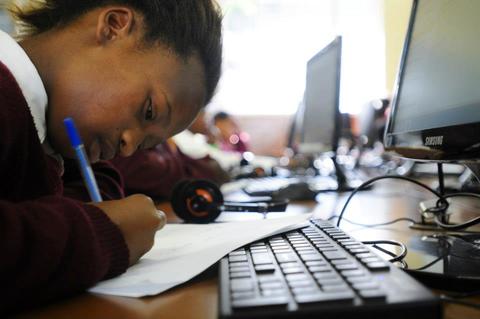
A little over 15 months ago, we started an experiment. We wanted to know if Khan Academy was viable in township (slum) areas in South Africa and if so, what type of impact it might have on numeracy. Numeracy in South Africa is astonishingly weak, with just 2% of Grade 9s scoring over 50% on the annual national assessments in 2012.
And so we set out to see if Khan Academy might be used as a catalyst for change. But before I expound on the results of this experiment, I ought perhaps give a little more background on the environments we’re working in.
Townships in South Africa are not unlike the favelas of Brazil or the slums bordering Delhi and Calcutta in India. They are urban areas that were, until the end of Apartheid in 1994, reserved for non-whites, but have now become residential hubs for the urbanizing masses. They are typically built on the periphery of cities and tend to be characterized by high population density, poverty and unemployment. Picture a ramshackle of makeshift houses constructed out of corrugated iron, wood scraps and cardboard, jigsawed together into a gigantic maze 5 miles wide and 10 miles across. At the risk of generalising grossly, that’s more or less the picture I want you to have in mind as you read this article.
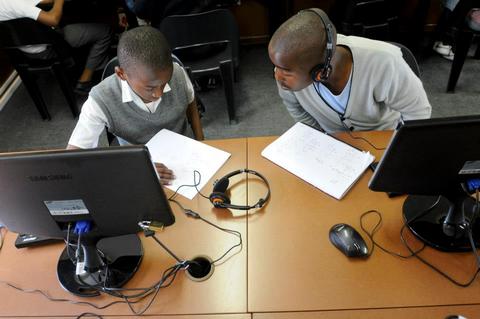
Now, townships in South Africa get a bad rap. They are viewed as ‘dangerous’ places and it is considered unwise to visit them unless you know someone there, or visit them as part of a ‘township tour’. Yet while crime rates in these areas are often high, the reputation does not do justice to the vibrant and persevering people who inhabit them. In particular, townships are YOUNG! On any given day, around two o’clock in the afternoon, the streets flood with uniformed, backpack-toting children on their way home from school. And despite having barely two pennies to rub together, they are meticulously dressed – shiny black shoes, starched white collars – and have aspirations to match. Most of the children in South Africa live in some form of township, which means that children growing up in these environments constitute the better part of the future of our country.
And yet it is supremely difficult to convince our best teachers to go and work in these areas. They are offered good jobs in well-resourced schools most often located in the wealthy suburbs of the cities. Principals at these schools compete fiercely for their skills. And this is as it should be. But it also entrenches the educational bias whereby a child’s access to quality education is directly proportional to the wealth of their family (see chart below).
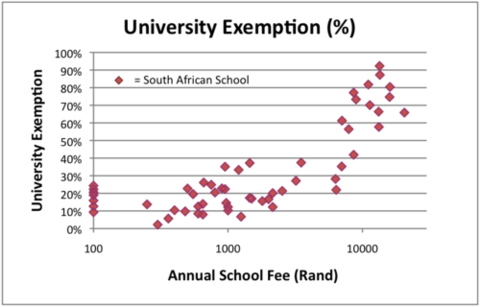
* University exemption rate refers to the percentage of learners who attain the academic marks in their final year of school that are necessary to gain access to South African universities.
So Numeric’s experiment was to see whether we could use Khan Academy, in conjunction with a slightly less skilled (and often unqualified) math coach, to create the high impact and stimulating learning environments enjoyed by kids living in wealthier suburbs.
The opportunity provided by Khan Academy premised on the following: Videos do not argue about where they are played; they are unaffected by crime and environment. Appropriately licensed, they do not cost anything. They do not grow weary, skip class, or grow jaded. Instead, they convey their message enthusiastically, faithfully, clearly – time and time again. A child may watch just as many videos as he/she has appetite for, and need never feel limited by the dragging on of a boring class or an inept teacher. For many children in South Africa, a Khan Academy video will be their first exposure to what we might term ‘world class instruction’. When complemented by the exercises on the Knowledge Map, Khan Academy becomes a powerful tool for turning the tide on numeracy in South Africa.
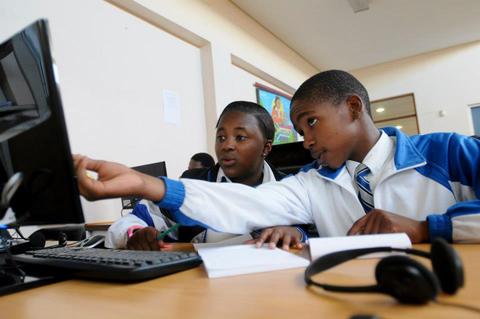
So what were the results of the experiment? Well, it’s probably too early to draw any major conclusions, but we do have a few figures we’d like to share. We currently run 7 Khan Academy classes across 3 different hubs in the Eastern and Western Cape provinces of South Africa. The first pilot group of 20 Grade 9s has just completed its first twelve months of Khan Academy and their numbers are as follows:
* Total Khan Academy hours delivered: 2220
* Total Problems Solved: 27,988
* Total Problems per learner: 1399
* Total Khan Modules Complete: 1232
* Average Modules per learner: 62
Bearing in mind this is an afterschool programme, these are 27,988 math problems that would not otherwise have been attempted. The 62 modules completed by the average learner constitute 62 gaps that those learners have filled. But it’s more about just the numbers; it’s about creating excitement and enthusiasm around learning. This is hard to convey in words, but perhaps a picture will suffice.
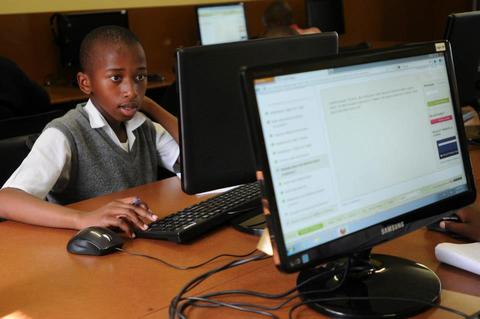
As we always say to our coaches, the tragedy in South Africa is not so much that kids don’t want to learn. It’s that some kids DO want to learn, but can’t. Khan Academy provides us one way to give these kids a world-class education without having to magically replenish our nation’s supply of teachers. And who knows, perhaps one day these kids will become the inspirational and talented teachers we have waited for for so long!
—-
Andrew Einhorn is the founder and current CEO of Numeric.org. His TEDx talk on Numeric.org and Khan Academy is available here.
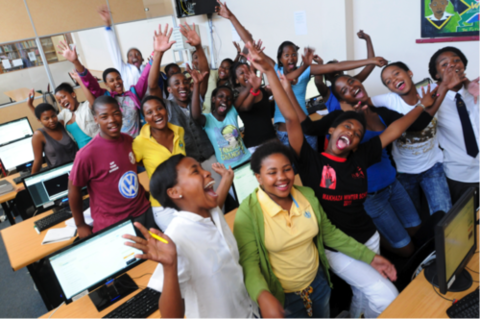
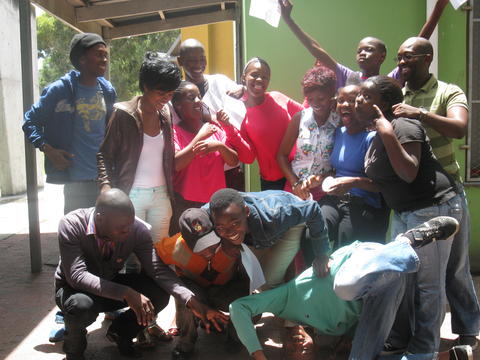

Thursday 3 January 2013 was a jubilant day for IkamvaYouth Nyanga as the Matric results came in. The Matrics made their way to the branch to share their results with staff, fellow students and tutors; and by mid-day, 100% of the learners’ results were accounted for.
Nyanga achieved a whopping 90% pass rate, broken down as follows: 30% bachelor passes and 60% diploma passes. The learners who failed to achieve a senior certificate qualified for supplementary exams.
Esethu Jack, who achieved a bachelor pass, said the following: ‘When I woke up this morning, I was very nervous, but I knew I had a bachelor pass.’ Aphiwe Sobutyu achieved a diploma pass and his mother, Mrs. Sobutyu had this to say: ‘he didn’t need to tell me. I already knew he had a diploma pass because it’s in his blood.’
It is gratifying to share the joy of success with the learners and their parents, and these results have motivated the branch to keep working to support the learners. One of the tutors, Busiswa Dayimani said, ‘these results are good and it makes me so happy to see the learners having done so well.’
Here are some inspirational stories from some of our learners:
Akhona Mtshwelo
Achievement – Bachelor pass
Accepted at UWC to study BCom Accounting
Akhona lives with her siblings and uncle in Lower Crossroads in Cape Town. Studying at home was often difficult for her since there are difficulties at home, with family members prone to picking arguments and fighting with neighbours, even late into the night. This means that she often had to wait for everyone to fall asleep before she could study. Her older siblings also failed to appreciate the hard work she was putting in at school and often gave disparaging remarks about her marks, despite those marks being higher than the grade and class averages.
During the 3rd term of her Matric year, she suffered from a severe knee problem for 4months, which prevented her from attending Saturday classes and afternoon classes at school. However, she persevered and studied alone at home, during that time.
Akhona has made it despite illness during a crucial time of the year, and an unsupportive family system. Her advice to the class of 2013 is that they work hard and have a good attitude towards their studies and teachers because attitude goes a long way.
Nomathamsanqa Dunga
Achievement: Diploma pass
Thami is a young woman whose fighting spirit saw her overcoming debilitating asthma throughout most of her high school years, to emerge as one of her school’s and IY’s success stories. Diagnosed with asthma while in Grade 9, she had to live with the condition, being hospitalized once after a severe attack.
During her Matric year, Thami faced a hostile learning environment at school, when the school combined the Matric Physics classes. She reports that it was similar to learning with one’s enemies, since relations between learners in different classes were far from cordial, at her school. At times she felt afraid to ask questions due to the abuse that would inevitably come from fellow class mates. However, despite all this, Thami worked hard and persevered and is one of the 2012 success stories.
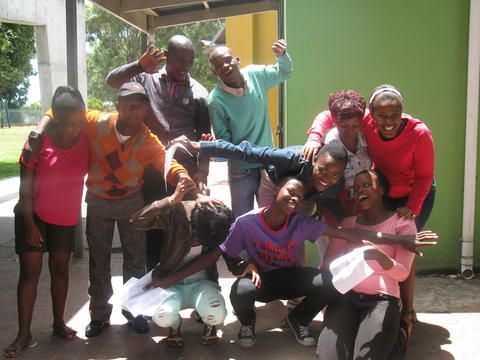
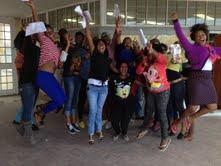

On Thursday 3 January the grade 12 results were released by the Western Cape Education Department and Makhaza achieved an 82% pass rate, up from 55% in 2011. This was testament to the hard work done by the learners and the tutors at the branch.
10 of the learners achieved Bachelor passes with 1 level 7 (83%) pass in Economics, 2 level 6 (71%) passes in Mathematics, 1 level 6 (71%) pass in Mathematical Literacy, 1 level 6 (76%) pass in Life Sciences and 1 level 6 (74%) pass in Accounting. 8 learners achieved Diploma passes and 5 learners Higher Certificate passes. The 5 learners that did not pass the exams all qualified for supplementary exams and we hope that Makhaza will have a 100% pass come the end of the supplementary exams.
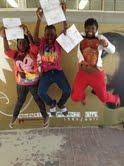
Yibanathi Phaphu, one of the top achievers said that he still couldn’t believe that he passed so well and that he is waiting for the feeling to sink in. He also said that he is looking forward to starting university where he will be doing a B. Comm degree, as he would like to be a Chartered Accountant, at the University of the Western Cape and didn’t expect to get Bs but that he just worked very hard. Sisabelo Pama another top achiever was really excited and couldn’t stop smiling and indicated that she will be pursuing a qualification in Electrical Engineering at Cape Peninsula University of Technology. Nomasomi Gugushe scored 83% for Economics and is planning to study construction management at CPUT. She said “I believe without IkamvaYouth I wouldn’t have passed my grade 12 like I did”.
The day was also marked by a bit of sadness, as we would have loved to see all the matriculants pass first time around, but mostly with joy as learners, parents, staff and tutors all celebrated the successes. The results also bear testament of what the learners are capable of when they really want to do something. In 2011 Makhaza had a lot of difficulties, with the office being petrol-bombed during service delivery protests and the teacher strikes that interupted the school year, but the matriculants of 2012 built on these difficulties and showed that they can achieve and do well even in the face of adversity.
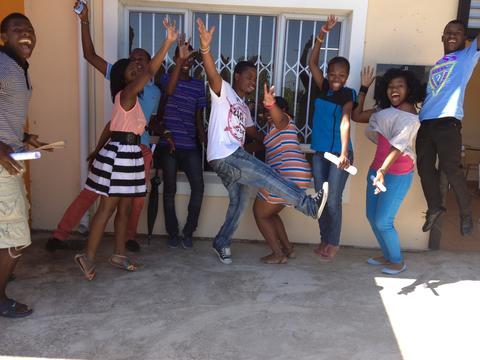
The solutions and innovations that will change the world – the cure for AIDS, technologies that will curb environmental destruction, art that unites and inspires – are inside young minds. Young minds that need an education so that these solutions can be developed and tapped. Sadly, most South African youth are enrolled in schools that struggle with the basics – from textbook distribution to learner safety – and so are denied the kind of education that engenders problem solving, innovation and leadership.
However, there is a fast-growing group of young people who refuse to be hopeless or overwhelmed. They are the ikamvanites: learners, tutors and social entrepreneurs who’ve developed an innovative solution to the problems of poor academic achievement and low access to tertiary education. Today, their branches in Gauteng and KZN are celebrating their 100% pass rate and 56% bachelor passes. Overall, 91% have achieved the bachelor or diploma passes they need to access tertiary education. Many ikamvanites excelled (22 distinctions achieved so far overall). “Education is the only thing that can catapult me, a daughter of a domestic worker, into the position where I can make gigantic improvements in our country and continent, by stimulating entrepreneurship, promoting education and tackling crime,” says Ntebaleng Morake, who achieved four distinctions. She’s been accepted at both Wits and UCT and will be studying Law and Politics next year.
The branches are celebrating their results with learners, tutors and parents. “IkamvaYouth has been incredible in helping my child to achieve so much at school. I am so happy today. Now- she has been accepted in three places- and we are confused what option she will take, though I know there are some out there who do not have even one option. Thank you, IkamvaYouth!” enthused Mrs Makhubele.
The Western Cape results will only be available either later this afternoon (according to WCED website) or tomorrow (according to the DBE). However, learners are currently arriving at the branches in Nyanga, Makhaza and Khayelitsha to share their results with their fellow ikamvanites and celebrating their bright futures.
“We’re very proud of all the learners and tutors and thankful to IkamvaYouth’s supporters who enable these life-changing results”, says Sbusiso Kumalo, board member of IkamvaYouth and head of Capitec’s Corporate Affairs. The tutors who help the learners to reach these heights are all volunteers. Most are university students and many are ex-learners from IkamvaYouth. They’re also the organisation’s greatest benefactors: this year, ikamvanites will be delivering the equivalent of well over 7 million rands’ worth of tutoring time to learners in nine townships in five provinces. The result of this phenomenal investment is an intensive, high quality programme that offers ongoing individual attention and support to learners for between R5k and R6k per learner per year.
IkamvaYouth is a by-youth, for-youth volunteer-driven initiative that was established in 2003 and has since been expanding across the country. There are no academic prerequisites for enrollment in the programme, which is free of charge. Most learners join with abysmal academic results and are from impoverished homes with unemployed caregivers. The impact of the programme is phenomenal. As Asanele Swelindawo, an orphan who managed to get three distinctions, says, “I now have the ticket to improve my life and one day be able to take care of my family”.
The full national results will be released once data from the Western Cape is available. IkamvaYouth sends an open invitation to all who want to join in the celebrations at their branches.

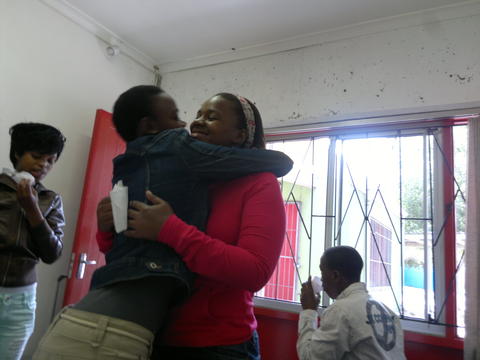
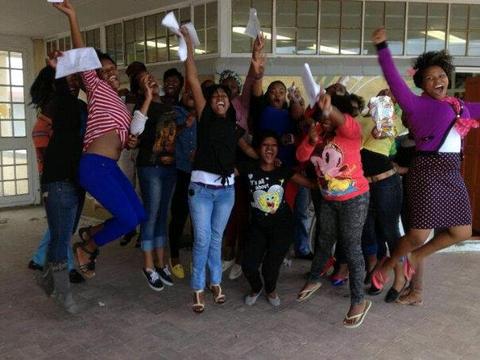
CONTACTS:
National Coordinator: Zamo Shongwe; zamo@ikamvayouth.org; +27837347246
Western Cape Coordinator: Liesel Bakker: liesel@ikamvayouth.org +27798854372
Gauteng Coordinator: Patrick Mashanda: patrick@ikamvayouth.org; +27 74 673 1215
KZN Coordinator: Thabisile Seme: thabisile@ikamvayouth.org; +27 716109838
IkamvaYouth has tried, tested and developed an effective model for addressing South Africa’s education crisis, and ‘it is working!’ We are now in five provinces, and receive countless requests from communities across the country to replicate the model. We are now gearing up to respond to these calls, and to do this we need your help.
Reflecting on the great impact IkamvaYouth has had on the lives of South African township youths over the past nine years is a hopeful and inspiring exercise. More and more learners are accessing free tutoring and homework assistance services, and reaping the rewards. Over 77% of Ikamvanites have, since 2005, accessed the post-school opportunities they need to pull themselves and their families out of poverty. And three out of five matriculating learners return to the organisation as volunteer tutors.
IkamvaYouth is on a path to ensure all children in South Africa who enrol in school successfully complete grade 12 or its equivalent, access post-school opportunities, and have a dignified living four years after matriculating. We acknowledge the great role of our partners and funders in making this possible, having learnt the crucial role of parents, communities, companies, other non-profits, government departments, schools and tertiary institutions.
IkamvaYouth’s greatest benefactors are the volunteer tutors and mentors, who in 2013 will provide over 8 million rands’ worth of after-school support. We’re now calling for financial donations from individuals to help us dramatically boost our impact. By investing in today’s learners, you’re also investing in the tutors for the following years’ learners.
IkamvaYouth is participating in the Global Giving Winter Open Challenge 2012, an opportunity that could land us a permanent spot on the Global Giving Website (www.globalgiving.org), an online giving platform for NGOs that will enable us to access donations from all over the world.
The challenge is to raise at least $5000 (about ZAR45, 000), from at least 40 different donors; between 26thNovember and 31st December 2012.
Give a life-changing gift this festive season, and empower the township youths of South Africa through education, replicating the IkamvaYouth model across the country. We can achieve a lot with any amount you can give. You can also make a big difference by sharing the challenge with others.
Click here to donate via creditcard, PayPal or gift card.
To find out more about IkamvaYouth, see www.ikamvayouth.org.


Each Ikamvanite shared their unique understanding of the vision and then collaboratively mapped the way forward, brainstorming the ways in which the different branches will implement it.
After re-visiting the vision, the group launched a discussion on the targets for 2013 and the IY budget, at both branch and provincial level. The targets set for our current Matrics lie between an 80% and 100% pass rate for all our branches across the country and our average spend per leaner continues to show that we can make a difference in the lives of the young people we work with, at very low cost. As testimony to this, 12 of our Matrics from the Makhaza branch have been pre-accepted into different courses at the University of Cape Town and this can be linked directly to the influence of the IY program and model.
The relatively low spend per learner partly motivates our vision to expand and replicate the existing IkamvaYouth model. Not only is our model tried and tested for 9 years, but it is cost effective and therefore accessible for everyone who wants to take part in building an even better South Africa.
Our day ended with the IkamvaYouth staff exchanging gifts. It was a fun but meaningful time, where we realised once again that IkamvaYouth is not just an NGO, but a family that really cares.
















 Lloyd Lungu
Lloyd Lungu